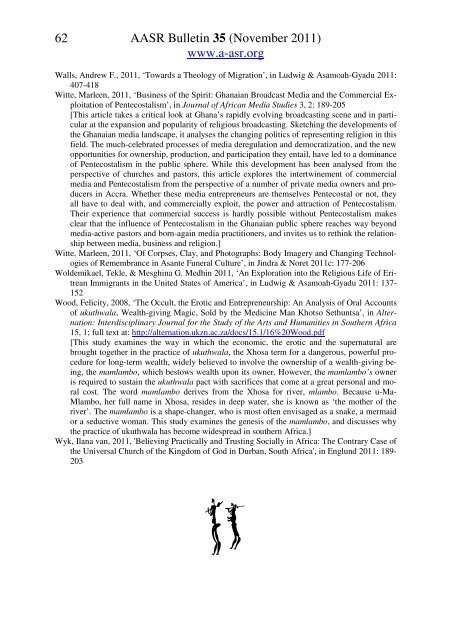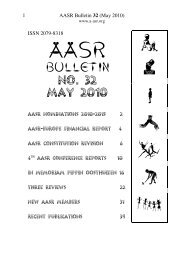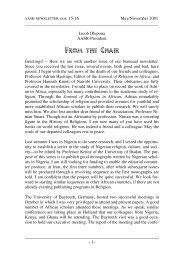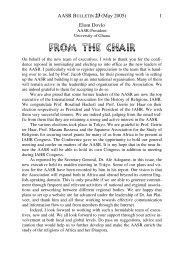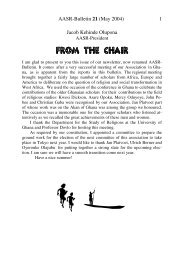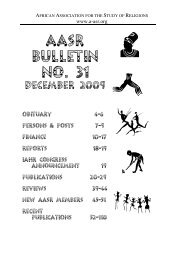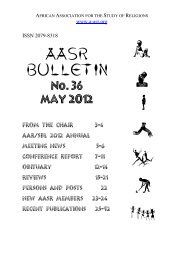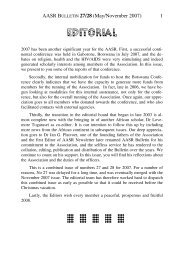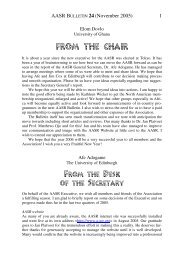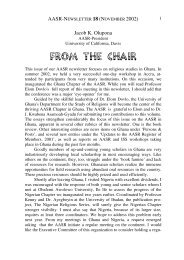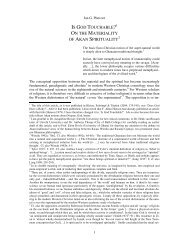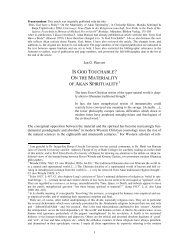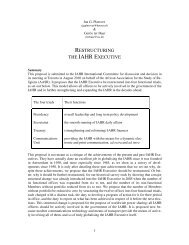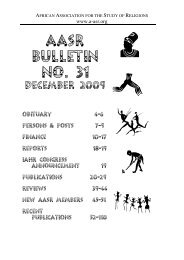AASR Bulletin 35 - The African Association for the Study of Religions
AASR Bulletin 35 - The African Association for the Study of Religions
AASR Bulletin 35 - The African Association for the Study of Religions
Create successful ePaper yourself
Turn your PDF publications into a flip-book with our unique Google optimized e-Paper software.
62<br />
<strong>AASR</strong> <strong>Bulletin</strong> <strong>35</strong> (November 2011)<br />
www.a-asr.org<br />
Walls, Andrew F., 2011, ‘Towards a <strong>The</strong>ology <strong>of</strong> Migration’, in Ludwig & Asamoah-Gyadu 2011:<br />
407-418<br />
Witte, Marleen, 2011, ‘Business <strong>of</strong> <strong>the</strong> Spirit: Ghanaian Broadcast Media and <strong>the</strong> Commercial Exploitation<br />
<strong>of</strong> Pentecostalism’, in Journal <strong>of</strong> <strong>African</strong> Media Studies 3, 2: 189-205<br />
[This article takes a critical look at Ghana’s rapidly evolving broadcasting scene and in particular<br />
at <strong>the</strong> expansion and popularity <strong>of</strong> religious broadcasting. Sketching <strong>the</strong> developments <strong>of</strong><br />
<strong>the</strong> Ghanaian media landscape, it analyses <strong>the</strong> changing politics <strong>of</strong> representing religion in this<br />
field. <strong>The</strong> much-celebrated processes <strong>of</strong> media deregulation and democratization, and <strong>the</strong> new<br />
opportunities <strong>for</strong> ownership, production, and participation <strong>the</strong>y entail, have led to a dominance<br />
<strong>of</strong> Pentecostalism in <strong>the</strong> public sphere. While this development has been analysed from <strong>the</strong><br />
perspective <strong>of</strong> churches and pastors, this article explores <strong>the</strong> intertwinement <strong>of</strong> commercial<br />
media and Pentecostalism from <strong>the</strong> perspective <strong>of</strong> a number <strong>of</strong> private media owners and producers<br />
in Accra. Whe<strong>the</strong>r <strong>the</strong>se media entrepreneurs are <strong>the</strong>mselves Pentecostal or not, <strong>the</strong>y<br />
all have to deal with, and commercially exploit, <strong>the</strong> power and attraction <strong>of</strong> Pentecostalism.<br />
<strong>The</strong>ir experience that commercial success is hardly possible without Pentecostalism makes<br />
clear that <strong>the</strong> influence <strong>of</strong> Pentecostalism in <strong>the</strong> Ghanaian public sphere reaches way beyond<br />
media-active pastors and born-again media practitioners, and invites us to rethink <strong>the</strong> relationship<br />
between media, business and religion.]<br />
Witte, Marleen, 2011, ‘Of Corpses, Clay, and Photographs: Body Imagery and Changing Technologies<br />
<strong>of</strong> Remembrance in Asante Funeral Culture’, in Jindra & Noret 2011c: 177-206<br />
Woldemikael, Tekle, & Mesghina G. Medhin 2011, ‘An Exploration into <strong>the</strong> Religious Life <strong>of</strong> Eritrean<br />
Immigrants in <strong>the</strong> United States <strong>of</strong> America’, in Ludwig & Asamoah-Gyadu 2011: 137-<br />
152<br />
Wood, Felicity, 2008, ‘<strong>The</strong> Occult, <strong>the</strong> Erotic and Entrepreneurship: An Analysis <strong>of</strong> Oral Accounts<br />
<strong>of</strong> ukuthwala, Wealth-giving Magic, Sold by <strong>the</strong> Medicine Man Khotso Sethuntsa’, in Alternation:<br />
Interdisciplinary Journal <strong>for</strong> <strong>the</strong> <strong>Study</strong> <strong>of</strong> <strong>the</strong> Arts and Humanities in Sou<strong>the</strong>rn Africa<br />
15, 1; full text at: http://alternation.ukzn.ac.za/docs/15.1/16%20Wood.pdf<br />
[This study examines <strong>the</strong> way in which <strong>the</strong> economic, <strong>the</strong> erotic and <strong>the</strong> supernatural are<br />
brought toge<strong>the</strong>r in <strong>the</strong> practice <strong>of</strong> ukuthwala, <strong>the</strong> Xhosa term <strong>for</strong> a dangerous, powerful procedure<br />
<strong>for</strong> long-term wealth, widely believed to involve <strong>the</strong> ownership <strong>of</strong> a wealth-giving being,<br />
<strong>the</strong> mamlambo, which bestows wealth upon its owner. However, <strong>the</strong> mamlambo’s owner<br />
is required to sustain <strong>the</strong> ukuthwala pact with sacrifices that come at a great personal and moral<br />
cost. <strong>The</strong> word mamlambo derives from <strong>the</strong> Xhosa <strong>for</strong> river, mlambo. Because u-Ma-<br />
Mlambo, her full name in Xhosa, resides in deep water, she is known as ‘<strong>the</strong> mo<strong>the</strong>r <strong>of</strong> <strong>the</strong><br />
river’. <strong>The</strong> mamlambo is a shape-changer, who is most <strong>of</strong>ten envisaged as a snake, a mermaid<br />
or a seductive woman. This study examines <strong>the</strong> genesis <strong>of</strong> <strong>the</strong> mamlambo, and discusses why<br />
<strong>the</strong> practice <strong>of</strong> ukuthwala has become widespread in sou<strong>the</strong>rn Africa.]<br />
Wyk, Ilana van, 2011, 'Believing Practically and Trusting Socially in Africa: <strong>The</strong> Contrary Case <strong>of</strong><br />
<strong>the</strong> Universal Church <strong>of</strong> <strong>the</strong> Kingdom <strong>of</strong> God in Durban, South Africa', in Englund 2011: 189-<br />
203<br />
>


